Arizona guilty plea in multi-state illegal body-parts ring
Jean Lotus — December 23, 2015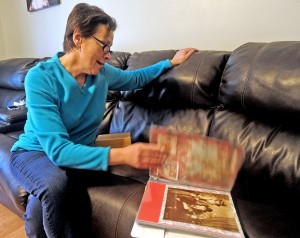
Linda Hayes thumbs through a memory book that her husband Tom made while he was in hospice. Linda Hayes lost her husband Tom about two years ago at age 56, and after donating his body to science, discovered that the FBI had found his remains at a company under investigation. Friday, December 18, 2015, in Elk Grove Village, Illinois. (Jon Langham-for Chronicle Media)
Part one: Loved-ones speak out about treatment of human remains
In late 2013, Linda Hayes, of Rolling Meadows, shed tears in her parked car in a Rosemont parking garage. She clutched a wooden box containing human cremated remains — a vessel engraved with the name of her husband of 34 years.
After Tom Hayes’ death at age 56, Linda agreed to donate his body to Biological Resource Center of Illinois, a for-profit human tissue donation firm that promised her husband’s body would be used in scientific research.
“Tom had a lot of health issues, and he wasn’t able to work for [much of] his adult life,” Linda Hayes said. “He thought donating his body to science was a way he could make a contribution.”
But a letter last spring from the Detroit branch of the FBI makes her think the remains in the wooden box are likely not her husband’s. Investigators told her they found her husband’s body, partially dismembered, with pieces sold in a multi-state illegal body parts ring.
In a three-day raid in January 2015 agents wearing hazmat suits, from the FBI and the Centers for Disease Control, closed Cremation Services, Inc., a Schiller Park crematorium at 9329 W. Byron St. They confiscated body parts and human tissue. They also seized records and computers from BRC-Illinois’ Rosemont office on the fifth floor of Rosemont Village Hall at 9501 W. Devon Ave.
No charges have been filed in Illinois against the father-and-son team, Donald A. Greene Sr. and Jr., who ran BRC-Illinois and the crematorium.
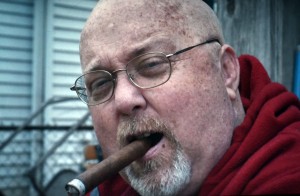
From a photo of Tom Hayes at about age 50. Linda Hayes lost her husband Tom about two years ago at age 56, and after donating his body to science, discovered that the FBI had found his remains at a company under investigation. Friday, December 18, 2015, in Elk Grove Village, Illinois. (Jon Langham-for Chronicle Media)
The FBI search warrant affidavit, filed in the Northern District of Illinois, alleges BRC-Illinois sold numerous body parts without proper consent of family members. The affidavit also alleges three companies in Detroit, Rosemont and Phoenix, Ariz. unlawfully trafficked anatomical specimens from people who had died of infectious diseases, including HIV/AIDS, MERSA, sepsis and hepatitis.
The Greenes’ family business was “a regular seller of human body parts … since at least the late 1990s, resulting in hundreds of thousands of dollars of interstate commerce,” the affidavit says.
A guilty plea was filed Oct. 7 by the Greenes’ associate Stephen Gore, owner of a Phoenix, Ariz. business also called Biological Resource Center.
Gore pleaded guilty to a felony charge of racketeering and to providing to vendors human tissue that was contaminated or was not authorized to be used by vendors according to donors’ wishes.
On Oct. 14, the Greenes’ insurance company, New Hampshire-based Peerless Indemnity Insurance Co. asked a judge in the Cook County Circuit Court to declare it has no duty to defend Cremation Services, Inc. against lawsuits over the alleged illegal business practices.
Although donations of organs such as kidneys, hearts and livers are heavily regulated by federal and state laws, under the United Network for Organ Sharing (UNOS) system, rules for the uses of other body tissue vary state by state, said Dr. Arthur Caplan of New York University’s Division of Medical Ethics.
Skin can be used in skin grafts, and bones can be used for dental implant paste or turned into screws to hold bones together during surgery.
But medical device development and sales and surgical training businesses are creating a “gray and black market in dead human bodies and body parts,” the FBI said in court filings.
“Resale and theft without oversight are creating these markets,” Caplan said in an email. “Also there is no guidance as to what a tissue bank can charge for ‘handling and processing.’”
Paul Dudek, executive vice president of the nonprofit Anatomical Gift Association of Illinois, said his company also provides donated cadavers, embalmed and un-embalmed, for medical school training. AGA was founded in 1918 and is overseen by area universities.
“In my opinion there’s a lot of regulation,” Dudek said. “It’s a question of individuals following the law,” he said.
When news of the FBI probe broke, Dudek said he fielded calls from donors and loved ones to see if BRC-Illinois was affiliated with his organization.
“We assured them we were not,” Dudek said.
“The other fallout [from the FBI probe] is a lot of institutions that were using BRC Illinois are calling us looking for specimens. We were literally getting calls every day. We are not ready to handle that kind of volume,” he said.
The active investigation has gone on for almost two years.
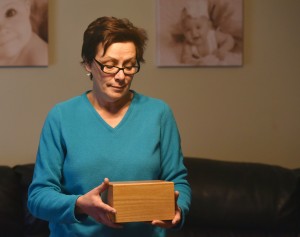
Linda Hayes holds a wooden box that contains cremated human remains, but she doesn’t believe they are her husband’s. Linda Hayes lost her husband Tom about two years ago at age 56, and after donating his body to science, discovered that the FBI had found his remains at a company under investigation. Friday, December 18, 2015, in Elk Grove Village, Illinois. (Jon Langham-for Chronicle Media)
It began in December 2013 when the FBI raided and closed down the offices of a Grosse Pointe, Mich. body-parts broker business called International Biological, Inc. run by Arthur Rathburn. Then, in January 2014, the FBI and Arizona Attorney General raided and closed the Arizona office of BRC in Phoenix. Around 1,000 human bodies, mostly of Illinois residents and some partially dismembered, were seized in the three raids.
“I got a report from the FBI that my husband’s body was found, missing his head and a whole arm,” Linda Hayes said.
“[The FBI] told me they found a paper trail that his body was leased to a nursing and anesthetics convention for $5,000,” Hayes said. “When [lab workers] were finished, they sent his body back and some of his joints were sold to two companies for $5,000 apiece,” she said. “They made at least $15,000 off my husband, and after that, no more paper trail.”
Even worse, in December 2014, the husband of Tom Hayes’ sister died, and his wife also donated his body to BRC-Illinois on the advice of Hayes.
“My sister-in-law received the same amount of ashes back that I did,” Hayes said.
“I don’t believe [the cremated remains] are Tom’s,” she said. “I have absolutely no faith that those are his. None.”
A comment from the Greenes was not available at Chronicle press time, but the company issued the following statement after the FBI raids:
Since the FBI executed a search warrant and took possession of BRCIL company documents, BRCIL has received many calls asking for information. BRCIL has attempted to answer each of these calls promptly, and as completely as possible under the circumstances. While BRCIL does not have full access to all company records, the company strives to answer all inquiries as they are received. BRCIL encourages any family members or loved ones with questions to contact us so we can attempt to answer any questions that people may have.
BRCIL has not been given an opportunity to review all of the FBI’s communications with individuals affected by this investigation so we are somewhat at a loss to explain what has or has not been explained by the government. BRCIL does have a robust policy in place that ensures donors’ cremated remains are properly maintained, tracked and eventually returned to loved ones if so requested. In some instances after the initial cremation process, BRCIL will receive cremated remains of the donor’s nontransplant anatomical materials after the material has been used for medical research or education. In that event, BRCIL would have a separate portion of a donor’s cremated remains.
The investigation begins
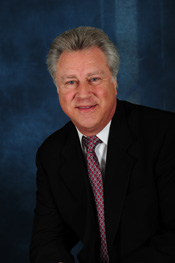
Donald A. Greene
Detroit’s Rathburn was identified in a 2006 book by investigative reporter Annie Cheney “Body Brokers: Inside America’s Underground Trade in Human Remains.” Rathburn has not been charged.
In 2012, the FBI said agents from the Centers for Disease Control stopped Rathburn at the Detroit airport on a return trip from Israel with “eight human heads with necks, wrapped in garbage bags, inside coolers containing red liquid.”
The heads had been supplied by BRC-Illinois, according to shipping documents, and one of them was found infected with sepsis. The FBI affidavit said subpoenaed records showed more than 50 human specimens sold or leased by BRC Illinois were contaminated with infectious diseases.
Hayes, her sister-in-law and several other plaintiffs filed lawsuits against the Greenes’ family businesses, alleging they were misled about the end-uses of their loved ones’ bodies and the final dispositions of their remains.
William Perkins, a retired Cook County Sheriff’s officer who was inducted by Mayor Richard Daley into the Seniors Hall of Fame, died of a stroke in November 2013. His family donated his body to BRC-Illinois. Perkins’ next-of-kin filed a class-action lawsuit in May after receiving notice from the FBI that their father’s head, shoulder and legs were discovered in a raid. The family thought they had received the cremated remains of Perkins months earlier. The family of Perkins also sued the hospice center and hospital which allegedly recommended Biological Resource Center of Illinois.
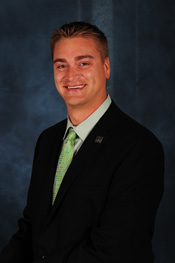
Donald A. Greene Jr.
“Since this started with a call from the FBI, it has been difficult for me and my family,” said Perkins’ daughter Penny Dixon in an email. “Now, especially, at this time of year, the loss of our father is worsened. We know that he is not at rest.”
Linda Hayes said she lost sleep for the past year thinking about her what happened to her husband’s remains.
“It was a complete desecration of him. It was like somebody hit me in the gut with a sledgehammer.”
Hayes said she wanted her husband and high-school sweetheart to be remembered as a sushi-loving, karaoke-singing father and grandfather, who never let his health problems stop him from pushing himself, even trying sky-diving.
“I know he was gone [from his body]; it was just a shell, but that shell still needs to be treated with dignity,” Hayes said. “I won’t let this go. I will never let this go.”
“Tom didn’t matter to them, and he didn’t matter to science. He was just another object they could make money from,” she said.
— Arizona guilty plea in multi-state illegal body-parts ring —



